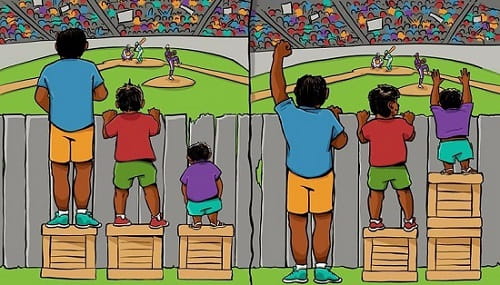Modified Lesson Plans For Special Education

As Special Education Teachers (regardless of what grade level or subject we teach), one of the biggest responsibilities we have is modifying lesson plans for Special Education students. It is up to us to be able to have a firm understanding of the content so that we can adapt and modify lesson plans for our Special Education students to be able to access the general education curriculum in a way that is meaningful for them.
What Does it Mean to Modify Lesson Plans for Special Education?
We know our students may have difficulties with processing information or comprehension, so bringing text and information to a more basic level allows them to access the same information everyone else has in a way that is more accessible to them.
Our students have diverse and sometimes specific needs to be able to receive and understand information that is presented to them. When we understand our students and how they learn, we are able to adapt and modify lesson plans for Special Education to meet the needs of all learners in our classroom.
Sometimes modifying lesson plans for special education means using a multi modal approach to learning. Teachers should be aiming to present the information not only in more basic terms to make it easier for students to comprehend, but also using different strategies to reach all types of learners (visual, auditory, kinesthetic).
Why do we need to do this?
We are evening the playing field for our students by bringing information to its’ most raw and basic form that is free from the ‘extra fluff’ that could make it difficult to understand. We are using tools and implementing strategies to allow our students to get the same opportunity as everyone else. Their education plans may look different, but it’s what they deserve. We wouldn’t be doing our job as teachers if we didn’t adapt and modify lesson plans for special education students and equip them with what they need in order to meet their specific needs as learners.
Who is responsible for this?
Typically the Special Education Teacher is responsible for modifying lesson plans for special education students. In a team teaching situation, the General Education Teacher will plan the lesson for their class and give the plans to the Special Ed Teacher to be modified to a level where Special Education students can access it. This could be something simple like providing notes that simplify the content presented, or could be adapted the entire lesson to more basic terms to be taught in a small group situation.
Special Education Teachers are taught how to adapt and modify lesson plans without changing the curriculum. Keeping the integrity of the lesson and information while presenting it in a way that is appropriate for all level of learners.
Tips on How to Modify Lesson Plans for Special Education
When given a specific standard of learning that your students must demonstrate an understanding of, it’s important to break down the standard. Some questions to keep in mind when modifying lesson plans for Special Education:
- What skill do you want your students to demonstrate?
- What is the main concept/goal of the lesson? Always keep the bigger picture in mind.
- What do you want your student to come out of the lesson knowing?
- Our students will not be able to retain every bit of information you teach, what are the more important facts/skills/ideas you want your students to know?
- You might even be able to eliminate some parts of the lesson that while interesting, are not critical to learning the concept/lesson. It’s a judgment call based on what you are teaching.
- Can the standard/skill be broken down even further?
- Sometimes the content/lesson needs to be broken down into smaller lessons to make the it easier for our students to understand. They need to understand the first concept before building on top of it.
- Can you remove any ‘jargon or fluff’ that may make the material more difficult to understand?
- For students with comprehension or processing difficulties, the extra verbiage in text can be completely distracting and confuse students further. It can also discourage students if they read a whole paragraph of words they barely understand and are supposed to understand it.
- How can you bring the content to even more basic terms?
- Think about how much we break down teaching life skills into super basic steps. We task analyze everything! In the same sense, we need to teach academic skills this way.
- What are other ways they can demonstrate understanding of the skill? (writing, multiple choice, verbal answering, etc.)
- Not all students will be able to dictate that they understand a concept the same way. Some students may need more options or accommodations to demonstrate understanding of material. Look at your specific students and make the best decision based on their ability levels.
- Always check… does the evidence (worksheet or activity) you have actually prove that the student meets the criteria of understanding that standard or goal?
- If you are creating material for a self-contained classrooms, you can always go over to another department and ask a teacher there to look over your lessons to make sure they are teaching the same concepts.
Sometimes simply creating new questions that are multiple choice to go along with a text may not be enough, the teacher might have to reteach the lesson or plan activities that will help students further understand the presented material.
One of the biggest mistakes when modifying lesson plans for Special Education is that some teachers are removing and changing too much of the content that it in turn, ends up changing the main idea or point that is being presented in the lesson. It is important to keep the meat of the content in the lesson or text. The material should be presented in simpler terms and broken down for students. A good idea when you are done modifying is to let the General Education Teacher review what you’ve done so they can confirm that it is still teaching the same ideas/material as the original lesson.
It’s not just about adapting lesson plans. YES, OF COURSE that is important and crucial in teaching. As Special Education Teachers, it’s also about continual check ins to make sure students are still with you. We have to present information with a multi modal approach to teach all learners. We have to give students opportunities to respond in different ways (as long as it demonstrates understanding). All the accommodations and modifications that students need to ‘even the playing field’ is what we are responsible for making sure every student gets. If all students are different, learn different, and see the world differently, why would we ever think that the same methods/tools would work with everyone?
Think about how you learn. Are there certain strategies or tools you use when you are learning or studying that help you understand, organize, and retain information better? We have the ability to implement strategies on our own that help us in our environment but our students may not. We have to learn about how they learn, figure out how to best address their needs, and equip them with that they need to succeed in education, but also in life.
*REMEMBER: We are all still learning! It might be hard at first as well as be time consuming but once you learn how to effectively adapt and modify lesson plans for special education, you’ll be a better teacher! Allow yourself to learn, make mistakes, and try again! Do it enough and soon it’ll become second nature to you. It also makes you a better teacher because then you start to teach and speak this way when working with your students, not just in certain academic lessons. So you’re constantly reaching all learners.
Other Benefits of Learning how to Modify Lesson Plans for Special Education
I find that from my experience as a Special Education Teacher, the skills I’ve learned in the classroom to modify lessons and materials have helped me when I talk to people where English may be their second language or if we are discussing topics certain people are not familiar with. Even when speaking to my own children, I am able to assess and analyze how to break down certain topics or life lessons I want to teach them in a way they can understand. It actually takes the fluff out of a lot of things and we realize how unnecessary that is for us but also for our students with learning disabilities. Simplifying things is not just beneficial for students with disabilities, it would do us all some good!

